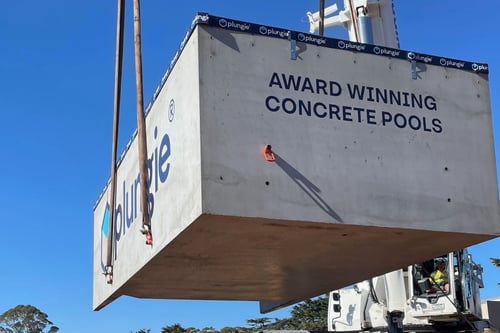Filtration and sanitising systems are essential to keep your pool chemical balance healthy. We get asked about saltwater and magnesium minerals all the time and whilst both are gentler on the skin than traditional chlorine pools, it’s important to understand the differences between the two.
Both saltwater and magnesium mineral pools work well to sanitise and maintain a healthy pool for you and your family. Saltwater systems use salt and chlorine, and magnesium mineral systems use magnesium minerals and chlorine. The chlorinator converts the dissolved salt or magnesium minerals into chlorine to sanitise the pool water.
The water clarity and general upkeep is similar between the two systems, with the primary difference being the water quality and skin benefits of a magnesium mineral system.
Saltwater pools
Salt pools use sodium chloride to produce chlorine and disinfect the pool. Unlike the ocean, they don’t produce a salty taste nor do they leave a salty residue on your skin and this is because the ocean has about 35,000ppm of salt while a saltwater pool will have about 2500-8000ppm.
Benefits of a saltwater pool
- Gentle on skin and eyes
- Suitable for many pool types and surfaces
- Cost-effective and easy to locate and purchase from your local pool shop, Bunnings, or even IGA
How much does it cost for a saltwater system?
Pool salt is generally very cost-effective and can be purchased for around $10 for a 20kg bag. On average, you would need to purchase 1-2 bags a month to maintain your pool.
Magnesium mineral pools
Magnesium minerals contain magnesium chloride, potassium chloride and sodium chloride. In combination, these allow for an enhanced swimming experience as they give the water a ‘softer’ feel.
A Magnesium mineral system can be used with a standard salt chlorinator, as it still uses chlorine to sanitise the pool water, so there’s no need to replace or upgrade a salt chlorinator to a specific magnesium system in order to use minerals in your pool.
Benefits of a magnesium mineral pool:
- Better water quality that is soothing for sensitive skin conditions
- Moisturises skin and hair
- Suitable for all types of pools as it is non-corrosive
- Child and infant friendly
How much does it cost for a magnesium system?
Magnesium minerals are generally more expensive than traditional pool salt, and retail at around $35 for a 10kg bag. On average, you would need to purchase 2-4 bags a month to maintain your pool.
Whichever option you choose, both Saltwater and Magnesium Minerals will ensure a healthy swimming pool experience for you and your family.



